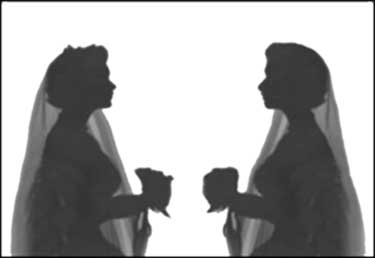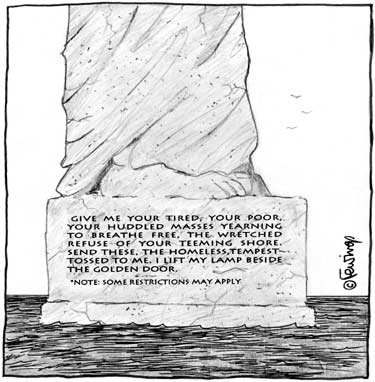![]()
Write us!
socialistviewpoint@pacbell.net
July/August 2004 • Vol 4, No. 7 •
Same-Sex Marriage
By Bernard Katz

President Bush has made this plea for marriage: “After more than two centuries of American jurisprudence and millennia of human experience, a few judges and local authorities are presuming to change the most fundamental institution of civilization.” To maintain this institution, the President is calling for an amendment to the Constitution, defining that marriage is a relationship between one male and one female only.
Why this urgency?
The reasons why the homosexual community wants civil marriages and not civil unions are many. Civil unions would bestow only about 350 of the state benefits that now accrue to marriage, in contrast to marriage that conveys about 1,000 federal benefits that many consider essential for financial security. Here are a few of the important differences:
Partners in federally recognized marriages are guaranteed the right to live out their last days together in the same nursing home room. Partners in civil union are not.
Married couples are married no matter what state they’re in. Partners in civil unions are not.
A widow is entitled to an array of state financial protections when a spouse dies. The survivor of a civil union is not.
Married couples can share ownership of their worldly goods—homes, cars, salaries—without paying a cent in taxes. Couples in a civil union cannot, leaving them vulnerable if the partner with the name on the deed dies.
“My husband (a gay male) and I are treated as financial strangers, yet we live our lives as an economic unit,” says Robert DeBenedictis, 41, who lives in Cambridge with his partner and two children. The men exchanged wedding vows in 1977, though the union held no legal weight.
For gay couples, the idea of civil unions, once a radical thought in Massachusetts—remember its Puritan background! —Now seems meager in comparison to the rights the high court said they should receive. Does religion play a role in the President’s decision, and those who agree with him, enough to urge a Constitutional amendment for monogamous marriage? You might think it does, because in the west, Christian Churches have declared marriage a sacrament for so long that we forget that this was not always so. In fact, the Church did not get into the matrimonial act until the ninth century! Until then, “marriage” was often simple, without benefit of clergy or government.
In our country, civil marriage without any church’s blessing has been made compulsory by the Puritans as late as 1653 (so much for the President’s reference to “millennia of human experience.”) In England, all that was needed in order to marry was a simple declaration and the clasping of hands (called “handfasting.”) Marriage was permissible at any hour, anywhere, without church bans or license, at any time. “Handfasting” was an old pagan ritual of marriage in the British Isles. It remained legal in Scotland all the way up to 1939, even after the Hardwicke Act of 1753 declared marriages in England valid only when performed by a clergyman. The Act was regarded as an intolerable imposition.
In fact, during the Middle Ages polygamy was not uncommon—many heroes were portrayed as having two or more wives. Polygamy was not definitely forbidden among European Jews until 1000 CE by Rabbi Gershom, and then at first only in France and Germany. Marriage, even more so than in the days of chivalry, was a temporary affair, with trial marriages lasting up to one year, and frequent change of partners was usual quite late in the Middle Ages. (This fact makes Henry VIII’s marital experiments more easily understandable. This also allows us to understand why most Frankish kings died before they were thirty—they were prematurely worn out!)
The homosexual community has its own arguments. Whether you call it marriage or not, they say, it is not up to the church or synagogue or mosque. No man running for president would say that he thinks the rights of Blacks, or Jews, or atheists to marry should be decided by an individual state. He’d be accused of being racist or anti-Semite, wouldn’t he?
Moreover, they hold, marriage has little to do with religion. While they often intersect, they are not dependent in any way. (Refer to the above commentary.) Men and women of no particular faith or god can and do join in marriage. A couple can be joined just as easily and legally by a Carnival cruise ship captain as it can by a priest. And how about common law marriages? Since marriage is not governed by any religious authority when it comes to “straights,” why shouldn’t it be the same for gays? Heterosexuals like the President claim that they are protecting the sanctity of marriage. If this is so, why are there so many divorces? The high divorce rate shows that straights are as committed to marriage as a 9-year-old kid is to practicing the piano! Gays a threat to marriage? Hell, say the gays, the straights are doing a fine job running that institution into the ground all by themselves.
As they say, anyone who claims to be on their side needs to support gay marriage, not a union but a marriage.
Remember what the Rev. Barry Lynn, executive director of Americans United Separation of Church and State, said? “I do not want to see the legacy of Thomas Jefferson and James Madison revised by President Bush under pressure from Pat Robertson and Jerry Falwell.”
—The American Rationalist, May/June 2004

Write us
socialistviewpoint@pacbell.net